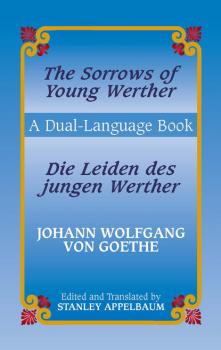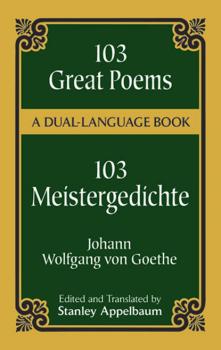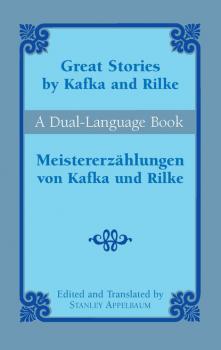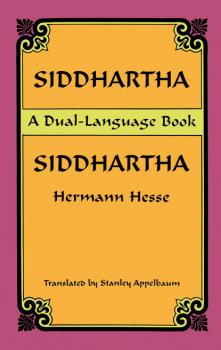ТОП просматриваемых книг сайта:
Dover Dual Language German
Скачать книги из серии Dover Dual Language GermanThe Sorrows of Young Werther/Die Leiden des jungen Werther - Johann Wolfgang von Goethe
Dover Dual Language GermanАннотация
Loosely based on Goethe's personal experiences, the novel is written mostly in the form of letters in which Werther recounts his unrequited love for a married woman. Its Sturm und Drang style, portraying the rebellion of youthful genius against conventional standards, makes it a perennial favorite with readers of every era.
Аннотация
The poems in this anthology represent a panorama of the main trends in the development of the poetry of the German-speaking people. Beginning with a minnesong of the early Middle Ages and a poem of the seventeenth century, the book then focuses on the Age of Goethe (1749–1832). Inspired by Goethe and his contemporaries, German poetry was able to develop according to its own genius and to advance along new lines that eventually led to the period of Expressionism and Post-Expressionism with which this anthology ends.Included here are the full German texts of 39 poems-lyrics, ballads, philosophical verse, humor, student songs-and three selections from longer works by Goethe, Novalis and Lenau. Some of the other poets represented are Walther von der Vogelweide, Schiller, Hölderlin, Heine, Rilke, Brecht, Hermann Hesse, Stefan George, Gryphius, Platen, Scheffel, Conrad Ferdinand Meyer and Albrecht Haushofer.For each poem, this book includes an expert literal English translation on the facing page. You'll also find a biographical and critical discussion of each poet, textual information and a portrait of the poet. Here is a wonderful opportunity to discover the depth and richness of the German poetic tradition, and learn the language at the same time.
Аннотация
Generally considered Germany's greatest literary figure, Johann Wolfgang von Goethe (1749–1832) produced a large body of fine literary work that includes novels, plays, stories, scientific treatises, travel accounts, and much other prose. Perhaps at his greatest as a poet, he was the author of numerous exceptionally fine lyric poems, ballads, and elegies.This convenient dual-language edition, spanning a wide range of styles, forms, and moods, allows readers to savor a rich selection of the poet's verse in the original German — from «An den Sclaf» («To Sleep»), written when he was 18, to his last great poem, «Vermächtnis» («Legacy»), written when he was 80. Several poems from the 1819 volume West-östlicher Divan (Occidental-Oriental Divan) are presented. Excellent line-for-line English translations on facing pages accompany such masterworks as «Prometheus,» typical of the Sturm and Drang (storm and stress) period; «Rastlose Liebe» («Restless Love») and «An den Mond» («To the Moon»), lyric pieces of intense beauty; and the narrative ballads «Der Fischer» («The Fisherman») and «Erlkönig» («Elf King»). Included among the 96 other works are these poems: «Auf dem See» («On the Lake»); «Zigeunerlied» («Gypsy Song»); «Jägers Abendlied» («Huntsman's Evening Song»); «Grenzen der Menschheit» («Limitations of Humanity»); «Der Zauberiehrling» («The Sorcerer's Apprentice»); and «An Werther» («To Werther»).For this edition, translator Stanley Appelbaum has provided an informative introduction and a commentary on each poem, which will prove invaluable to students, teachers, and general readers.
Great Stories by Kafka and Rilke/Meistererzählungen von Kafka und Rilke - Rainer Maria Rilke
Dover Dual Language GermanАннотация
At the turn of the twentieth century, the city of Prague hosted a cosmopolitan culture whose literary scene abounded in experimental writers. Two of the city’s natives are featured in this dual-language volume: Franz Kafka, whose fiction is synonymous with the anguish of modern life; and the poet Rainer Maria Rilke, whose stories unfold in the same transcendent lyricism as his verse.Twelve of Kafka’s stories from the compilation Ein Landarzt (A Country Doctor) appear here, along with two tales from Ein Hungerkünstler (A Hunger Artist). Rilke's stories include «Die Weise von Liebe und Tod des Cornets Christoph Rilke» (The Ballad of Love and Death of Cornet Christoph Rilke), «Die Turnstunde» (The Gym Class), and Geschichten vom lieben Gott (Stories About the Good Lord). Stanley Appelbaum has provided an introduction and informative notes to these stories, along with excellent new English translations on the pages facing the original German.
Аннотация
Lyric poetry blossomed in 19th-century Germany under the fertilizing influence of Romanticism with its focus on the primacy of the imagination, worship of nature and childhood, dreaminess and nostalgia and preoccupation with thoughts of night and death. Although strictly defined as flourishing from 1798 to 1835, Romanticism is not timebound and German Romantic poetry was written both before and after these dates. Indeed, the 131 poems in this volume range in date from 1770 to 1903.Collected here are great romantic poems by 23 poets: Goethe, Schiller, Hiilderlin, Novalis, Tieck, Brentano, Ruckert, Heine, Miirike, Storm, Nietzsche, and 12 more. Stanley Appelbaum has provided excellent new literal English translations of the poems on facing pages, along with an informative introduction and concise evaluations of each poet. This is a wonderful opportunity for any student of German or lover of poetry to enjoy a rich sampling from one of the world’s great poetic traditions.
Аннотация
Nobel prize-winning author Hermann Hesse imagined life in India during the lifetime of the Buddha to create this memorable tale about a restless seeker of enlightenment. First published in 1922, Siddhartha employs powerful symbolism to impart its timeless teachings.The story concerns a young Brahman who quits his comfortable home to join a roving group of holy men in striving to empty their hearts of passion and desire through self-denial and meditation. Discouraged by his failure to find Nirvana after three years of the strictest asceticism, the young seeker turns to the fleshly world, where he becomes a wealthy merchant and partakes of sensual pleasures with a sophisticated courtesan. Years of materialistic self-indulgence numb Siddhartha's soul, but at his moment of greatest despondency, he begins to experience his long-sought spiritual awakening. True enlightenment, he realizes, cannot be received from the lessons of others; it must be attained through individual struggle. This handy dual-language edition — with its excellent line-for-line English translation on pages facing the original German text — offers students an outstanding opportunity to hone their German-language skills while discovering a literary classic.
Аннотация
Designed expressly for the beginning German language student, here is an outstanding collection of fifty-two short stories, poems, essays, and anecdotes. Each selection has been specially chosen for its power to evoke German life and culture. This dual-language edition features precise English translations on pages that face the original German text. New students will enjoy the pleasure of reading great German literature from the very first page, as the selections have been arranged to accommodate the gradual improvement of language skills. Helpful vocabulary and language exercises are also included. First German Reader features the works of many of Germany's best writers, including Goethe, Hesse, Heine, Schiller, Hölderlin, and other literary virtuosos. The translations of Harry Steinhauer are vivid and true to the originals—and poetic in their own right. Literature lovers, German language students, and other readers will find this volume an accessible exploration of German literature . . . and an invaluable aid to mastering the German language.







